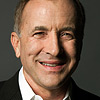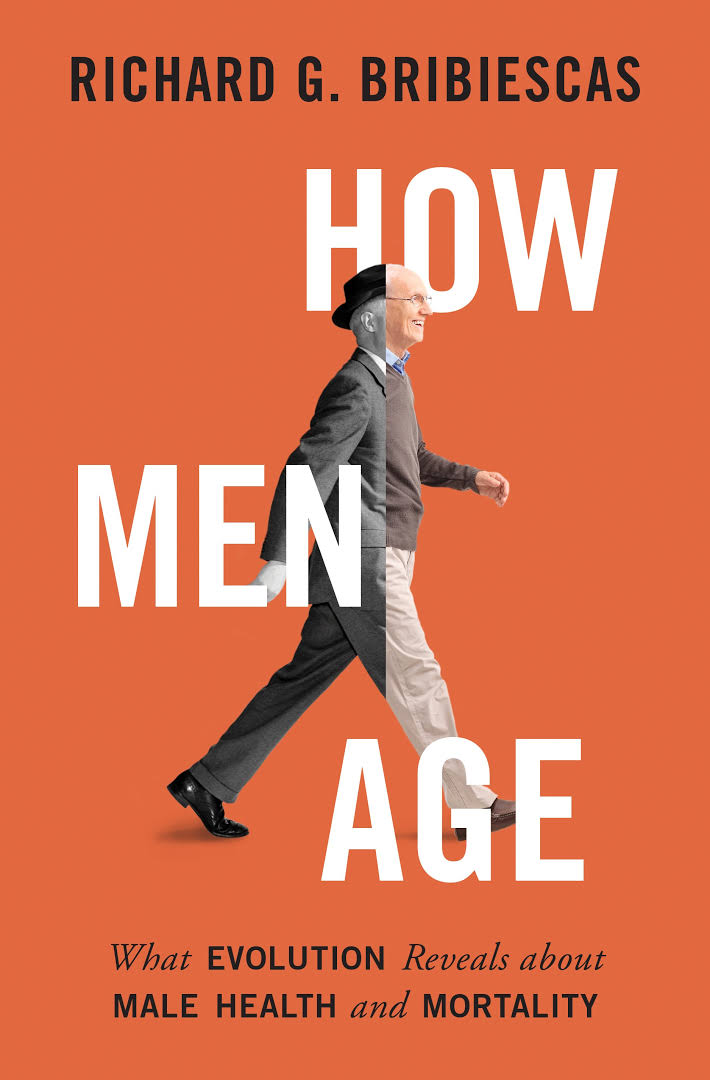Richard G. Bribiescas is a professor of anthropology and evolutionary biology at Yale University and his new book is the best short summation I have seen of a massive body of scientific research to address his title subject, How Men Age. Now that I am in my early 60s I find myself gravitating toward this literature, but this is not a how-to book. There is no men’s magazine-style bullet list of what older men should do to look and be young again. Bribiescas is a good scientist, and as such he makes it clear that all such studies are limited in scope, have exceptions, and the long-term consequences of any artificial interference with the aging process beyond diet and exercise are unknown. Caveat emptor! Here is what we know.
Aging is the decline in physiological function that occurs over a measurable passage of time, caused by a combination of physics, genes, disease, and other environmental assaults and stressors. Aging is highly heritable, which is why physicians and life insurance companies always ask about the age of your parents at death and the causes of their deaths. But there is no “gene for aging,” or even a suite of genes. Aging happens across most of the systems in your body and there’s only so much you can do to stave off its inevitable effects. Worse, tinkering with the aging process too much can lead to a phenomenon the biologist G. C. Williams discovered called antagonistic pleiotropy—traits beneficial to an organism early in its life may be detrimental later in life, such as women’s high ovarian steroid levels during peak reproductive age that can lead to breast cancer decades later, or high testosterone in young men that leads to prostate cancer in old age. So the idea of taking testosterone supplements to ward off aging’s effects may have unintended and possibly antagonistic pleiotropic effects that lead to even earlier mortality.

According to “rate of living theory,” larger mammals conserve heat more efficiently, have slower metabolic rates, burn energy slower, and live longer. Humans are relatively large mammals and we live longer than any other primate, but within our species even though men are larger than women they burn more energy per unit time, so men age faster than women and women live longer than men. As well, because the world is a dangerous place and men face many more risks than women, they tend to discount the future and reproduce earlier, just in case.
Environment also makes a difference. The evolutionary biologist Steven Austad conducted a study of opossum populations, one on an island with no predators and the other on the mainland with the usual assortment of threats to life and limb. Austad found that the island opossums reproduced later and aged slower whereas the mainland opossums reproduced sooner and aged faster.
What about human populations? Bribiescas has conducted research on the traditional hunter-gatherer Aché people of Paraguay, where he has witnessed many young girls age rapidly once they started having children. Why? Entropy. “The daily grind of activities necessary to care for a family surely contributes to their physical decline.” At his lab at Yale University, Bribiescas’s research group hypothesized “that women who have more children will exhibit physiological signs of accelerated aging,” and they tested this hypothesis on a group of rural postmenopausal Polish women who were part of a long-term study on women’s health by the University of Krakow. The researchers found that women with more children had significantly higher levels of oxidative stress compared to those who had fewer children, which is revealing because oxidative stress is one of the key physiological markers of genetic, cellular, and tissue damage associated with aging in all organisms.
Men don’t suffer such reproductive costs, but their aging comes from other assaults on their bodies as a result of competing for women and resources. It’s a cost-benefit trade-off argument: “a male who engages in a behavior or invests in metabolic processes that increase his present mortality risk by 1 percent but also promotes his probability of mating opportunities will have potentially greater fitness benefits compared to a female who engages in the same risk and mating benefit since access to more than one mate will not increase a female’s fitness.”

Among the many activities that leads to earlier mortality for men are the stupid things they do to win the affections of females and gain status among their fellow males. “Men are willing to bet a stack of survivorship chips if the big payout is the possibility of sex,” Bribiescas avers. Studies in the evolutionary psychology of mating strategies show that young women tend to prefer men who engage in risky behavior—the risk taking being a “costly signal” that indicates to a female that a male’s genes are so good he can afford to take such risks. Men smoke, drink, gamble and partake in risky sports more than women, and are less likely to seek medical attention when ill.
There’s another type of fitness beyond evolutionary, and that is physical. Getting a handle on men’s love handles is one Bribiescas addresses in discussing aging and the metabolism of men. Why do we have them? Humans are sexually dimorphic, which means that men and women differ in size and strength, the most common difference involving muscle mass and tone. Human hunters don’t have awesome claws, fangs, or antlers, but we have upper-body strength and we can throw projectiles, the capacity for which appears to have evolved in humans (but not as much in chimps and other primates) around the time that hunting developed in human history.
Declines in testosterone, lower metabolic rates, and shifts in the hypothalamic-pituitary-testicular (HPT) hormone axis is what ultimately makes men go soft in the middle. Testosterone levels peak in the second decade of life, decline until around age 40, and remain stable thereafter. Encouragingly, Bribiescas cites a study by endocrinologists in which younger men (age 19–35) and older men (age 60–75) were given testosterone supplementation (controlled for natural background rate differences) that found “increases in overall fat-free mass, muscle growth, and strength to graded doses were not significantly different between younger and older men.” Both age cohorts responded positively, and in fact “older men exhibited significantly higher testosterone levels in response to each graded dose compared to younger men.” Meaning? “Younger men may have more efficient liver and kidney function, resulting in higher clearance rates, or, more interestingly, there may be differences in hypothalamic function in response to testosterone.”

This would seem to confirm the in-flight magazine ad for anabolic hormone therapy for men featuring the older physician with the young buff body, but Bribiescas cautions that he is “not aware of any clinical studies indicating that this therapy regimen is safe.” Nevertheless, he continues, “other clinical studies strongly suggest that men can improve strength and vigor with hormones.” So why don’t our bodies do this naturally? It’s the trade-off problem again. Fueling all that extra muscle is expensive, and evolution probably selected for a shift in investment costs over time—older men don’t need as much muscle because they are putting their valuable resources elsewhere, and “muscle-induced increases in metabolic rate can tax the limits of other organs such as the heart, liver, and kidneys.” I.e., there’s no free lunch. There are trade-offs at every stage of life. You want your 25-year old body back at 75? You can have it but you are going to pay a price somewhere, and we do not yet fully know what that price might be.
We do know one penalty men pay for having a higher metabolic rate than women: shorter lives. The best study on the relationship between basal metabolic rate (BMR) and mortality is the Baltimore Men’s Study on 972 men over 40 years that found BMR declined with age, but in men with naturally higher BMR their mortality increased. Specifically, compared to a younger age group, elevated BMR in men age 33.9–36.4 was 28 percent higher, and in men 36.5 or older mortality increased 53 percent, although Bribiescas cautions that “this study raises the question of why some men have higher BMR than others.” There may be intervening variables not yet determined.

More trade-offs: taking testosterone supplements may lead to fat loss and muscle bulk and strength, not to mention making you feel virile and strong again, but there is some evidence that taking testosterone supplements may lead to a serious myocardial infarction within a few weeks, compared to men not taking the hormone. It may also suppress immune function, not to mention the well-known effect that high testosterone men are more likely to engage in risky behaviors that have their own mortality risks. In the end, Bribiescas concludes in this book that should be read by all men age 50 and older (and young men who hope to grow old), “As anyone who has had one martini too many can tell you, feeling good does not necessarily mean you are engaging in healthy behavior.” ![]()

Michael Shermer is the publisher of Skeptic magazine, a monthly columnist for Scientific American, and a Presidential Fellow at Chapman University. His book The Moral Arc is now out in paperback. Follow him on Twitter @michaelshermer.
This article was published on November 30, 2016.

















I just turned 61. This has been a fascinating discussion of those elements germane to the (protracted) witness of our own and the universe’s eventual dissolution. I never was a fan of intervention, yet I readily accepted Walter Reed AMH’s procedure giving me super-vision. While I hope my telomeres will be sufficiently intact that I may live until I die, I have to temper that optimism with the pragmatic wish that I will be psychologically prepared for the last great act of living.
In addition anecdotally it would appear genetics has significant bearing. I have seen people that have maintained a healthy active lifestyle and experience a rapid decline before death.
The exercise and efforts elevate the quality of life however not the life expectancy.
Hi Pete,
I am quite aware of the Malthusian prediction of running out of resources. One of my geo.profs used to ruminate that the 3 B are going to do what an earth-shattering meteor so far has not been able to accomplish: a mass extinction. The 3 B’s being: bulldozers, babies and bombs. That was in the 60’s, as you probably can guess.
How many generations do you think it would take for the human race to become extinct if everyone decided having children is not worth it, b/c of the threat of overpopulation? It boils down to the one question: What is the purpose of life?
As far as being certainly(?) presumptuous is concerned, just answer the last question, perhaps it will give you an inkling what I would suggest might be a better choice, once you consider any deep insight you might arrive at on your deathbed.
Be happy.
Nick
I had a thought about cardio exercise and BMR. Exercise seems to increase the BMR overall, plus burns calories. Over time, this leads to a decreased resting heart rate. Those few hours per week of increasing your heart rate should mean fewer heartbeats per day overall. This tends to correlate to people living longer and have increased quality of life regardless of when they finally die.
Jim Fixx is used as an example of why not to exercise. He ran a lot and died of a heart attack anyway. What people might not realize is that he knew he was in trouble. Virtually ever close male relative of his died of a heart attack in their early 40’s and he wrote about it. Yet running increased his quality of life and probably gave him 8-12 more years of life.
The day before he died, he felt heart pain. He said something to a doctor neighbor who shrugged it off as probably nothing. He then had a fatal heart while running the next day. An autopsy reveled he had a massive heart attack the previous day that would have killed an average person, but he seemed okay enough.
So much for that subject. Now onto something different.
It seems each strand of DNA in our bodies has little caps called telomeres. As each cell ages, occasionally a telomere breaks off. But there are multiple telomeres, so the cell remains viable. Eventually, the last one is gone, the DNA molocule unravels hopelessly, and the cell dies.
I’m sure studies confirm that these little deaths lead to signs of aging. Hair goes gray or stops growing in spots. The skin loses elasticity. Organs start to be less efficient.
Now the science fiction.
Wouldn’t it be nice if we could prevent the telomeres from breaking off? If that were possible, we’d never physically age beyond 25. The only death to fear are from accidents and cancer. If we can’t prevent aging, maybe it’s possible to infect every cell of our body with fresh DNA with a full set of telomeres intact, turning our body’s clock to 25. This technology also introduces the real possibility to change other characteristics, such as eye and hair color. You could also fix many genetic diseases. But this opens up an ethical can of worms.
Until then, it seems telomeres rule our lifespans. Keep them intact and we live longer.
Great article different and interesting. Perhaps digging into why we feel the need to live forever when upon examination the vast majority of our lives trudge through the mundane and are arguably individually of little significance other than contributing to the carbon cycle.
A lot of potential fact checking required. Hey, I trust Michael’s research. Regardles, my experience is similar with hormone therapy. In my 50s tested low quality of life improved anecdotally and measurably.
Do I care if I loose a few months / years… nope.
On a more philosophical note our western desire to be young forever will not be reached through biological rather, through transhumanism. A line of thought worth pursuing especially with advances in technology and the looming singularity.
Perhaps a follow on article is in order?
Please, advise Michael and I would love to collaborate or contribute.
Allan
My female comment: I, too, am turning 61 and suddenly have felt the decline in strength and stamina. It coincides with being two years into total, apparently final-no-surprises, menopause. I emphasize the suddenness of this, not a gradual decline. Of course, there are unknown variables such as Midwest climate and retail job stressors entering the holiday consumerism. But I never married nor had babies, nor ever engaged in any risky behavior. People say they would never guess I’m beyond 50. The subject of aging lends itself to study since everyone is interested in it. That article in WSJ is probably torn out by now, well-read, in many public libraries. Shermer has put out the moral temptation, ha ha ha. Excellent work and food for thought here.
Nick,
It is certainly presumptuous to judge somebody’s happiness level that you don’t even know based on their marital status and whether or not they have children. You seem to be breaking your own maxim of “be kind”. Given the disastrous consequences we face now and in the future from human overpopulation, I heartily applaud anyone who has decided to go childless, for whatever reason.
John,
Nothing ventured nothing gained. Does that ring a bell?
Having lived for a while(I’m 84), I can state without reservation that you have ignored evolution’s prime directive: Be kind and be happy. Being born is a high risk activity, whether by design or accident. How can you be happy if you do not have a wonderful wife and children to share your life with? Obviously your interpretation of happiness differ from mine.
May you be happy, nonetheless.
Nick
The research on testosterone replacement in aging men AND men with coronary heart disease shows overwhelming benefits in terms of improved strength, energy, libido and reduction of vascular events, lessening of angina symptoms, improved insulin sensitivity, reduction in the risk of metastatic prostate cancer, relief of depression and mental lethargy as well as a reduction in osteoporosis and sarcopenia.
Testosterone replacement done properly does not cause prostate cancer nor heart disease……..it prevents these diseases from progressing or occurring. I am so convinced of that that I get every one of the coronary artery disease patients in my cardiac rehabilitation program on testosterone replacement whenever possible. Women also benefit from bio-identical hormone replacement immensely.
The only real risks of testosterone replacement are elevations in estradiol and RBC count which only occurs in 15 – 20% of treated men, which are easily monitored with periodic blood tests and even more easily treated with an aromatase inhibitor and periodic blood donations (which also has its own vascular benefits). There are hundreds of published articles going back to the late 1930’s documenting the benefits of hormone replacement in men and women both.
There are two organizations devoted to dispersing the latest anti-aging information to health professionals world wide (American Academy of Anti-Aging Medicine and the Age Management Medicine Group). I recently had my telomeres measured at the 2016 Age Management Conference and found I am biologically 8 years younger than my chronological age. That’s no guarantee I will live longer, but it is suggestive. Most everyone who is active in anti-aging medicine is more interested in an improved QUALITY of life over quantity as that is unpredictable.
This is my 21st year on testosterone replacement and it has helped me avoid the metastatic prostate cancer that killed by father at age 63 as well as slow down several common physiological changes that occur with aging. I see these same benefits occurring in the patients in our anti-aging clinic.
Well there you have it. Now I know why I never got married or had children. I did not engage in high risk activities after I began college.
The research on longevity can be summarized in a few sentences:
1) calorie restriction slows metabolism
2) the only promising anti-aging medications slow metabolism to the same extent as calorie restriction
3) Life is limited to approximately 120 years despite the best technologies available for the foreseeable future.
4) exercise to avoid being fat if you lack the self control for calorie restriction and longevity.
5) If heart disease, degenerative brain disorders, and cancer don’t get you then accidents will. The challenge in stopping aging is that different parts of the body experience degradation at different rates with different degrees of susceptibility.
6) Cryogenics programs are unlikely to ever work and uploading your consciousness into a computer and claiming it’s still you either implies your present thoughts are meaningless, you’re engaging in superstitious thinking, or you’re confused.
Good summary. You’ve saved some people tons of reading, if only they’ll believe you.
What does this article have to do with evolution? Answer: nothing.
Evolution has everything to do with everything since time marches forward. If you believe the theories of Rupert Sheldrake and Deepak Chopra (a collective unconscious), you might be interested to know that a BIG shot retail executive stated to me on Tuesday, out of the blue, “everything is evolving.” We were talking about consumer behavior and the need for 16-year-olds to have cars. For the male, a possible sex symbol to impress females.
Since we don’t know what the risks are of even mild testosterone supplementation – how can they be managed?
Statins have a significant risk level. It would seem to me that taking them when you do not have serious cholesterol problems is just asking for trouble.
Beta blockers are, I believe, primarily used to control high blood pressure – thus putting less stress on the heart. But I don’t think they would do much, if anything, to improve a person’s muscle mass or strength.
My experience is that personal health and capability is quite complex. One’s understanding of their body’s functioning is hindered by lack of baseline data for comparison to current values and the difficulty of obtaining current data. So, I agree that regular monitoring is necessary coupled with continuing education to enhance understanding of the input-output relationships of our body’s functioning. For example I call attention to the chemical contents of our foods, such as the amount and kinds of fiber we consume. Also the kind and amount of exercise we get seems critical. I find approaching my body’s functioning as a chemical plant operation very helpful. We can’t change how it got designed and built, but we can control how it is operated and maintained.
I have found that taking testosterone supplements plus statins and betablockers have given me a quality of life I wouldnt have had. The key I feel is regular monitoring and paying attention to all risk factors. In the UK this is free thankfully and is a matter of gently persuading your doctor of what you require.
Yes there are risks with testosterone supplementation, but they can be managed